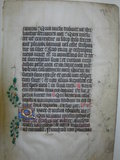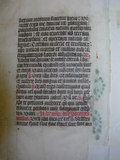Lima Public Library Leaf 16
This is a leaf from a French breviary of the late 13th century, containing text with clerical instructions for the performance of church ritual throughout the year. A chief physical characteristic of these leaves is the shriveled and dirtied condition of their upper right corners, possibly from water damage. The decoration involves an unusual style of bright green ivy in the left margins, connecting together heavily-illuminated initials. As is the case in many breviaries, the black text is rendered in two sizes to distinguish readings from responses and prayers. The leaf measures 10.5 x 7.5 cm.
Text: Not fully identified, but contains Job 19:23-27 and 10:18-20 (recto) and Job 10:20-22 (verso).
 Lima Leaf 16 Recto
Lima Leaf 16 Recto
Lima Public Library Leaf 16 Recto
 Lima Leaf 16 Recto Transcription
Lima Leaf 16 Recto Transcription
-rámini? Quis mihi tríbuat ut scribántur sermónes mei? quis mihi det ut exaréntur in libro stylo férreo et plumbi lámina, vel celte sculpántur in sílice? Scio enim quod redémptor meus vivit, et in novíssimo die de terra surrectúrus sum: et rursum circúmdabor pelle mea, et in carne mea vidébo Deum meum: quem visúrus sum ego ipse, et óculi mei conspectúri sunt, et non álius: repósita est hæc spes mea in sinu meo.
R. Requiem æternam dona eis, Domine, et lux perpetua luceat eis. V. Qui Lazarum resuscitasti a monumento fetidum: tu ei, Domine, dona requiem et lux per. Lec. iii.
Quare de vulva eduxísti me? qui útinam consúmptus essem, ne óculus me vidéret. Fuíssem quasi non essem, de útero translátus ad túmulum. Numquid non páucitas
 Lima Leaf 16 Recto Translation
Lima Leaf 16 Recto Translation
[Job 19:23-27]
...flesh? 23 Who will grant me that my words may be written? who will grant me that they may be marked down in a book? 24 With an iron pen and in a plate of lead, or else be graven with an instrument in flint stone. 25 For I know that my Redeemer liveth, and in the last day I shall rise out of the earth. 26 And I shall be clothed again with my skin, and in my flesh I will see my God. 27 Whom I myself shall see, and my eyes shall behold, and not another: this my hope is laid up in my bosom.
[Responses for the requiem not yet translated.]
[Job 10:18-20]
18 Why didst thou bring me forth out of the womb: O that I had been consumed that eye might not see me! 19 I should have been as if I had not been, carried from the womb to the grave. 20 Shall not the fewness...
 Lima Leaf 16 Verso
Lima Leaf 16 Verso
Lima Public Library Leaf 16 Verso
 Lima Leaf 16 Verso Transcription
Lima Leaf 16 Verso Transcription
diérum meórum finiétur brevi? Dimítte ergo me, ut plangam páululum dolórem meum, ántequam vadam, et non revértar, ad terram tenebrósam, et opértam mortis calígine: terram misériæ et tenebrárum, ubi umbra mortis et nullus ordo, sed sempitérnus horror inhábitans. R. Libera me, Domine, de morte aeterna, in die illa tremenda quando coeli movendi sunt et terra, dum veneris judicare saeculum per ignem. V. Dies illa dies ire calamitatis et miserie dies magna et amara valde. Quando. V. Quid ergo miserrimus quid dicam vel quid faciam dum nil boni perferam ante tantum iudicem. Dum ue. V. Nunc, Christe, te petimus, miserere quaesumus. Qui venisti redimere perditos, noli damnare redemptos. Dum.
[Rubrication untranscribed.]
Dies illa dies ira et ce. V. Ardentes anime slent sine fine slent sine fine am-
 Lima Leaf 16 Verso Translation
Lima Leaf 16 Verso Translation
[Job 10:20-22]
...of my days be ended shortly? suffer me, therefore, that I may lament my sorrow a little: 21 Before I go, and return no more, to a land that is dark and covered with the mist of death: 22 A land of misery and darkness, where the shadow of death, and no order, but everlasting horror dwelleth.
R. Deliver me, O Lord, from eternal death, on that fearful day when the heavens are moved and the earth when thou shalt come to judge the world through fire.
[The remaining responses are not yet translated.]